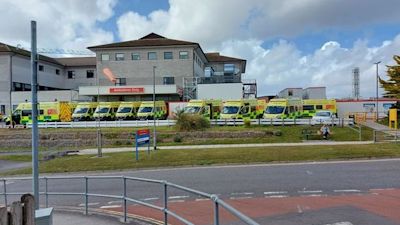Routine and urgent surgery suspended at Cornwall's main hospitals

Routine and urgent surgery is being suspended at Cornwall's main hospitals amid intense pressure on NHS services.
There are more than 40 people in Cornwall's hospitals with Covid and more than 100 healthy patients who are ready to go home but cannot due to a lack of care plans.
Pressures are being made worse by "unprecedented demand" on the ambulance service in the region.
As a result all routine and urgent surgery has been cancelled at Royal Cornwall Hospital, St Michael's Hospital and West Cornwall Hospital.
Royal Cornwall Hospitals NHS Trust's medical director Dr Allister Grant said it was a difficult decision but will enable clinical teams to care for people needing emergency treatment. He said critical surgery will still take place.
Dr Grant said: "There has been no let-up in demand and we currently have more than 40 people in hospital who are Covid-positive and nearly 50 more who are contacts and need to be isolated.
"A large proportion of the patients admitted for other medical problems or injuries have been unaware they have Covid until tested on admission and need to be cared for in separate areas to other patients."
Dr Grant went on to praise staff, saying they are working "extraordinarily hard" to help care safely for the higher numbers of people in hospital with Covid.
"Anyone whose appointment needs to be changed will be contacted directly - there is no need to call us - otherwise patients should continue to come to hospital as planned, following the pre-admission instructions they will have received," he said.
"We will also continue our work with the Duchy Hospital in Truro to carry out as many operations there as we can."
He said pressure in the hospital has been compounded by the unprecedented demand on the ambulance service as well as how many severely ill people require treatment.
There are also more than 100 people in the Trust's hospitals who are medically ready to leave but still require care and support packages.
He urged people to make sure they choose the right NHS services when it is not a 999 emergency.
"By calling their own GP first or contacting 111, we will be able to concentrate on those in most need of specialist care and help us get ambulance crews back on the road," he said.